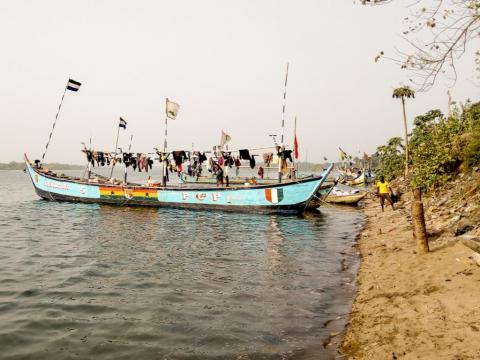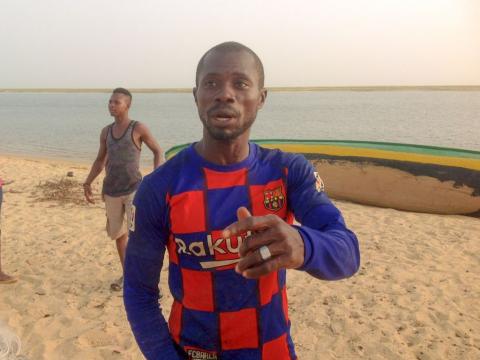By Kemo Cham
“Today is a bad day,” says fisherman Munda Dasama, shouting at the top of his voice, over the sound of the roaring sea waves behind him, as he disembarks from his boat.
The exhausted-looking young fisherman has been at sea for about two hours.
“I caught only six kilos [of fish] today. That’s Le60, 000,” he says, which is roughly US $6. While standing on the beach at Liya Kpaka, a small community in Pujehun District, he laments the trend of low fish catch that is worrying the people of his small fishing community.
Liya Kpaka, with a population of approximately 500 people, is one of about 50 fishing communities lining the stretch of beach along the Moa River, where it meets the Atlantic Ocean, at the southernmost end of Sierra Leone.
The lamentations of these communities reveal a long silent suffering, which many residents say is thanks in large part to the illegal and destructive practices of industrial fishing trawlers operating along the country’s coastline.
Referring to his fishing trip, Dasama says he spent Le77, 500 (roughly US $7.75) on fuel and engine oil to go to sea on that day, along with two of his fellow fisherman. Over a month ago, Dasama says they had four nets, three of which were destroyed by an industrial fishing trawler. He said with four nets, they caught enough fish to take care of their expenses.
"Now I cannot even afford to buy fuel and engine oil," he says.
From Goderich in Freetown, to Tombo in the Western Rural District (regarded as the largest fishing center in the country), to the southern region, the complaints of Sierra Leone’s artisanal fishermen are the same. Fish catches are dwindling.
For a country where 80 percent of the population relies on fish as the main source of protein (according to the Ministry of Fisheries and Marine Resources), this is a major problem.
The United Nations Food and Agriculture Organization (FAO) estimates that about 83, 000 tonnes of fish is caught from Sierra Leone’s marine waters annually. According to fisherman operating all along the country’s coast, the majority of the fish caught is netted by foreign-operated vessels – mainly Chinese and Koreans – who sell to foreign markets around the world.
Pujehun is one of four districts that make up the southern region of Sierra Leone, the others being Bonthe, Bo and Moyamba.
Pujehun and Bonthe are among the top four districts, alongside Kambia in the north and Banana Island in the Western Area, that serve as major attraction to these industrial fishing trawlers.
From the beaches of Liya Kpaka, just about a three-mile distance away, is located Sulima, the most important fishing center in the district. Because of its strategic location at the border between Sierra Leone and Liberia, Sulima is also a popular entry point to Sierra Leone's fish-rich waters for boats from other neighboring countries - mainly Liberia, Guinea, Senegal, Cote d’Ivoire and Ghana. There is a whole community of Ghanaians living in the community, who are also a dominant force in the fishing business.
Yet, according to fisherman such as Dasama, the trawlers pose the greatest challenge to the local fisherfolk – not only through overfishing, but also through the destroying of nets of the local fishermen, when they encroach into the Inshore Exclusion Zone (IEZ), an area close to shore that is preserved for small-scale fishermen, and as a breeding and nursery ground for fish.
According to the FAO: “The IEZ is solely reserved for artisanal fishing boats. However, industrial vessels often flout the IEZ regulation, which results in conflict with artisanal boats for fishing grounds, often leading to the destruction of artisanal fishing nets, crafts, and sometimes loss of life.”
Highly sophisticated and powerful, when these trawlers encroach into the IEZ, they leave behind them destruction. There are reports that they use illegal nets that leave nothing behind, called gill nets, and also employ illegal fishing practices like “pair trawling,” where two boats drag a massive net between them.
All these practices are thought to be contributing to the depletion of Sierra Leone's fish stock.
Sulima is already at the brink, as a result.
"For the last one month it has been difficult to get fish," laments its Town Chief, Siaka Massaquoi.
According to him, this fish scarcity has led to a rise in incidents of theft in the community, as people struggle to make a living. Many other residents, he adds, have been forced to leave the community for greener pastures.
The majority of the population of Sulima use paddle canoes and the smallest of the boats with outboard machines to fish, and because of the boats’ vulnerability to the effect of the violent sea waves, they are forced to fish only within the Moa River. Only when the tide is a little favourable, they can go across the ‘bar mouth’ (the boundary between the sea and the river), into the ocean.
There they encounter the trawlers and the Ghanaian-owned Fanti boats which they say destroy their nets.
A popular fishing practice by local fisherfolks is to set their nets at night, and then go to pull them up in the morning. The fishermen say the destruction of their nets often occur at night, while they are sleeping.
Sulima is host to one of three main bases for the Navy (the Marine wing of the Republic of Sierra Leone Armed Forces or RSLAF) in Sierra Leone. But armed with just one boat, which is rarely operational, for the entire Sulima area, the Navy has been of little help to the artisanal fishermen.
They say whenever they report destruction of their nets, the Navy will request information they are often not in a position to provide, like the registration number of the suspected trawler. Sometimes, the trawlers cover their registration numbers.
But even when they don't, says Dasama, they will never allow the smaller boats to get close. He says sometimes the foreign trawlers even threaten them with firearms.
“Sometimes they also attempt to hit your boat to capsize it,” he adds.
The few times the Navy has responded to the calls of the fishermen, Dasama says they have rarely caught any of the suspected trawlers because by the time the Navy gets to the scene, the suspected boat is gone.
For his own part, the Navy base Commander declined to comment on the situation when approached by Politico, citing lack of authority to do so.
In Pujehun, the Ministry of Fisheries and Marine Resources is represented by Fisheries Officer Elkeline T. Kposowa – who, along with his one junior colleague, covers the entire district, encompassing a large area, stretching from the Liberian border all the way to neighboring Bonthe District.
Kposowa says that the lack of capacity often limits their ability to effectively monitor fishing activities in the district. He says he relies entirely on the Navy and Marine police for support to respond to any issue at sea.
“But they have only one boat,” Kposowa says, “which is hardly operational. It hasn’t been in good condition for some time now.”
Like all previous governments, the Sierra Leone People's Party-led administration promised to invest in the fishery sector, with the goal of maximizing the benefits for the country’s economy. In the party’s 2018 campaign manifesto, SLPP also promised specifically to reduce illegal fishing in the country, in part by “implementing effective and sustainable surveillance systems”. However, two years into the first term of the administration, fishermen say there is little indication that much is being done towards this.
Another major concern they currently have is the dramatic increase in boat licensing fees. They say the fees are so exorbitant that they have worsened their hardship.
Even more difficult for them to understand is that, even when they manage to pay the costly registration requirement, they don't receive reciprocal gesture from the authorities, particularly in terms of protection from the intruding foreign fishing trawlers.
"Fishing is our life,” laments Dasama. “It's all we do here. The rice we eat... even to buy 'Maggi' and pepper to cook, and sugar…we depend on our fishing [for all of this]. The government asks us to pay a lot of money as license, and when we have problems they don't do anything to help us.”
The increment in the license fee was part of a major policy shift by the new administration in 2018, through which the ministry assumed responsibility of registering three out of six categories of fishing boats, including the foreign trawlers. The local councils, which used to register all categories of boats, now only handle three categories –which, one official says, constitutes an insignificant contribution to their revenue base.
Mohamed A. Kabba, Chief Administrator of the Pujehun District Council, says the highest fee the local council now registers a boat for is Le150, 000 (about US $15). Whereas, the boats that the ministry now registers pay between Le1.5million (US $150) and US $4,000.
According to the ministry, as of December 2019, there were over 12,000 registered local fishing boats and about 80 foreign trawlers.
Kabba says the majority of the boats operating in the waters in Pujehun fall within the categories under the purview of the ministry.
As a consolation, the council is supposed to collect fees from the trawlers and other larger boats, through charging them landing and evacuation fees. But, Kabbah says, because of lack of capacity, they delegated the responsibility to the ministry – and, since the policy was introduced, he says they have not received a penny from the ministry for these fees.
The Sierra Leone Fishermen Consortium is a group of fisherman unions, formed to represent the interests of artisanal fishermen across the country. However, it was until recently a divided house, leaving fishermen fending for themselves. A spokesman for the consortium says they were aware of the issues affecting its members, but notes that over the last two years, they have witnessed a lot of improvements thanks to the policies of the new government.
Campaigners, including the Environmental Justice Foundation, say that illegal, unreported and unregulated fishing compromises the health of fish stocks and the marine environment. However, many cite corruption and lack of monitoring capacity as having rendered Sierra Leone’s waters a haven for many of these foreign vessels.
The country has a total of 506km of coastline, which is over 200 nautical miles of sea to monitor. And for this, it has only one boat with the capacity to travel the long distance. Acquired in 2015, the vessel, named Sorie Ibrahim Koroma, is 25 metres long and, when it was inaugurated, was billed to cover over 200 nautical miles in a very short period.
But observers say a single boat is not sufficient to police the space.
Sierra Leone’s waters are protected under a collaborative initiative called the Joint Maritime Commission (JMC), which includes the navy, police and other stakeholders. But the operations of the JMC too is limited by lack of resources.
However, technological improvements over the years have made monitoring the seas easier, even for countries like Sierra Leone. For instance, there is the Vessel Monitoring System (VMS) which is fitted on every vessel registered in the country. The devise sends signals all the times, once it is turned on, indicating what it is doing and its location. However, in order to avoid detection, many of the vessels involved in illegal fishing in Sierra Leonean waters are thought to switch off their VMS systems.
By the time of publication, the Ministry of Fisheries had not granted a request for an interview on this subject.
Copyright © 2020 Politico Online









